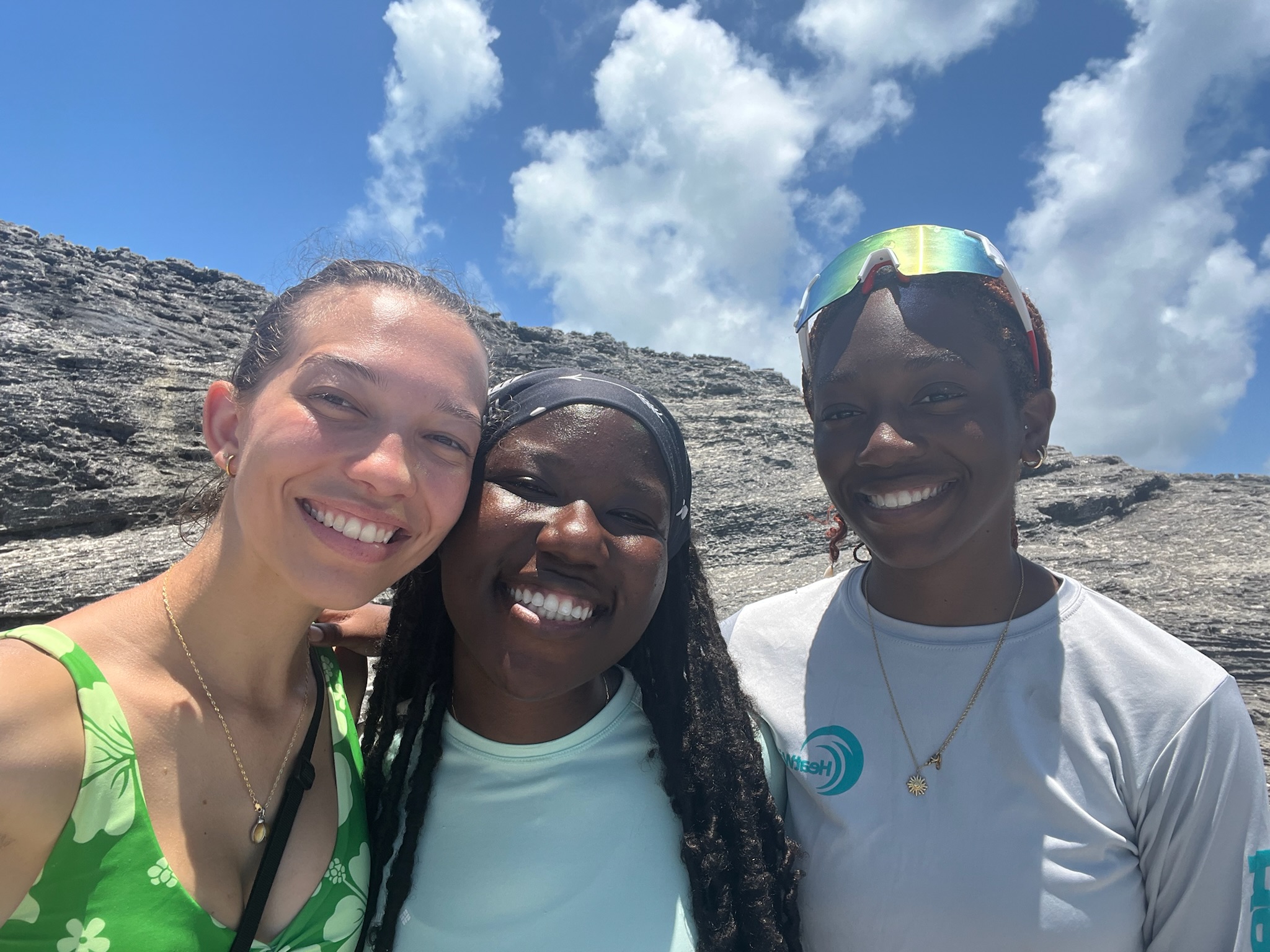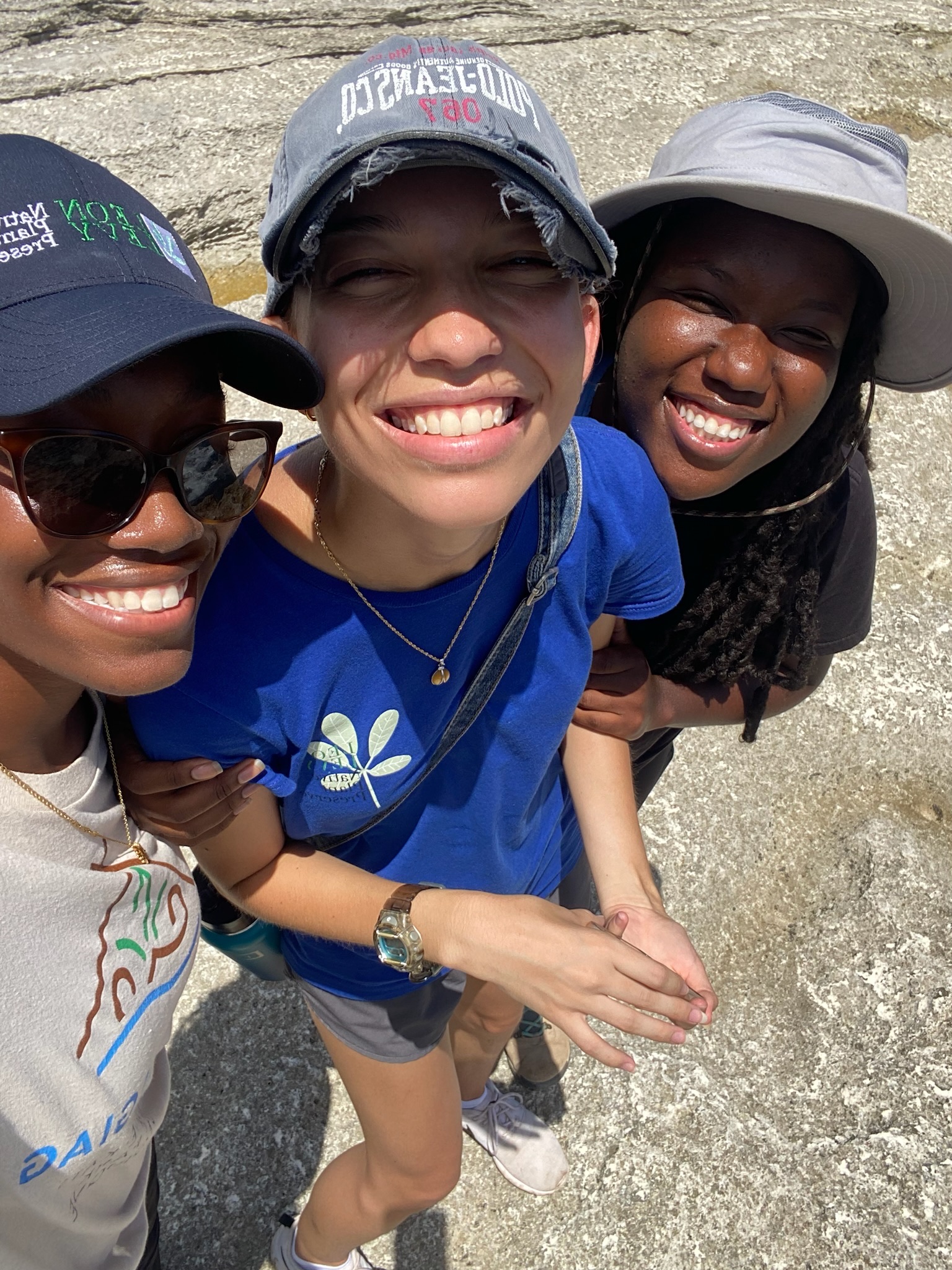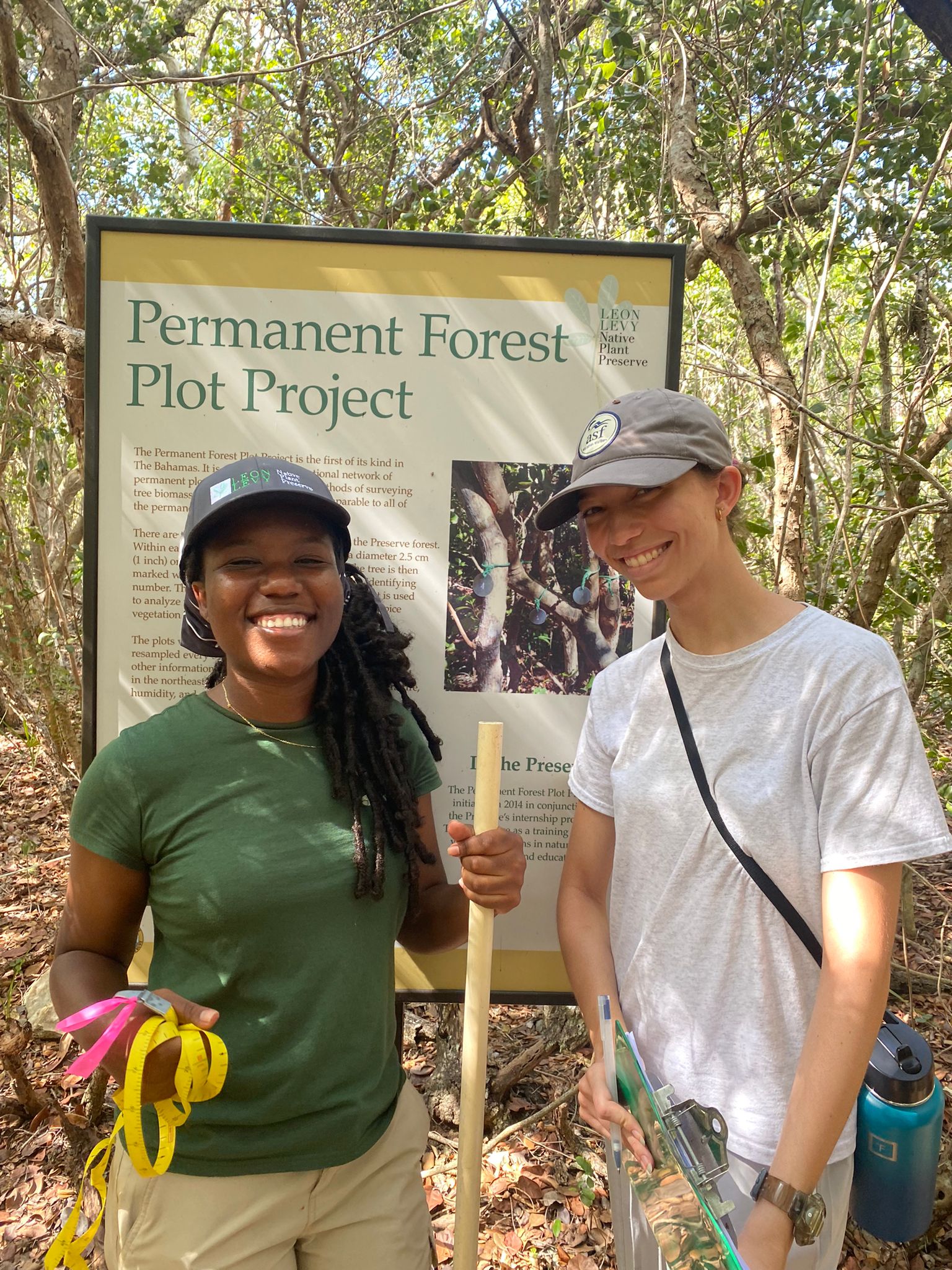Levy Preserve Interns Recount Life-changing Summer of Learning, Exploration & Fun


April 4th, 2025 – Nassau, Bahamas
By: Leah Carr
Every year, the Leon Levy Native Plant Preserve (LLNPP) hosts a summer internship for Bahamian students interested in or studying botany or plant-related environmental sciences. The intensive eight-week program exposes participants to the unique ecology of The Bahamas while providing hands-on experiences in plant taxonomy, research, and conservation. It also introduces students to the work of the LLNPP and The Bahamas National Trust in advancing terrestrial conservation in The Bahamas and internationally.
This distinguished internship celebrated 10 years in 2024. We reached out to last year’s interns to ask them to share their thoughts and experiences throughout their memorable journey.
Birthing a Lifelong Connection to the Environment
Empress Sears, 20 years old; Amber Wells, 22 years old; and Khori Stubbs, 21 years old, all embarked on their LLNPP internship together on May 27th, 2024. But each of the three young women had already had their own personal encounters with the wild, remote, and vibrant ecosystems of The Bahamas beforehand. Amber, in particular, recalled summer visits to Long Island as being instrumental in developing her interest in botany and the natural world around her.
“My visits to Long Island were marked with unique experiences. For any Bahamian, it’s hard to ignore our natural environments, but one of my biggest motivations for pursuing botany was my grandmother,” she said. “I remember snooping through a chifferobe in her room when I was younger and discovering a plant press ‘in action,’ with an accompanying specimen-filled folder. It was such a simple introduction, but there isn’t a doubt in my mind that my current passion for collecting and mounting herbaria specimens stems from that moment.
“Beyond that, I was inspired by her everyday lifestyle – growing and harvesting her own produce, offering herbal remedies to others, and just her general respect for her natural surroundings. Combined with a lifelong closeness to Bahamian landscapes, my love for botany is a product of those experiences.”
Khori’s interest in the environment was fostered during summers spent at science-based camps, hosted by organizations like the Bahamas Reef Environmental Educational Foundation (BREEF) and The Bahamas Engineering & Technology Advancement (BETA) Camp.
“I enjoyed learning about the environment and being able to identify the flora and fauna around me,” she said. “My interest was nurtured throughout high school as I gained more knowledge about how our actions as humans affect the environment, along with all the resources we obtain from it.”
Empress found it harder to pinpoint a specific moment that roused her general interest in environmental work, but always recognized the importance of combating climate change – especially given The Bahamas’ vulnerability to its impacts.
“My desire to actively participate peaked during the Covid-19 pandemic,” she said. “It was amazing to witness the ways in which the environment began to equilibrate due to limited human activity. In addition to this, learning more about the environmental protection agencies in The Bahamas and also joining the BNT’s Navigators assisted with fostering this interest.”
With this unifying passion for the Bahamian environment, all three women were equally enthralled and inspired at the opportunity to participate in the LLNPP’s 2024 internship. Selected from a pool of qualified applicants, Empress, Amber, and Khori commenced a summer of concentrated learning, exhaustive field work, amusing adventures, and cultivating connections through botany and conservation.
Cultivating Relationships and Expanding Environmental Perspectives through Botany
Under the tutelage of Dr. Ethan Freid, Amber, Khori, and Empress spent copious amounts of time daily learning how to identify more than 100 species of native, non-native, and invasive plants throughout The Bahamas; how to use taxonomic keys for plant identification; and about the history of taxonomy and early botany in The Bahamas.
Dr. Freid – the Leon Levy Native Plant Preserve’s botanist, as well as Internship Coordinator – played an instrumental role in the Preserve’s development. With his vast knowledge of the institution and a wealth of expertise in botany, he led the interns through an immersive program with plenty of opportunities for hands-on, in-field, and even car-centric experiences.
“I never thought my favorite place to do botany would be in a car,” said Amber. “‘But ‘car botany’ is almost a necessity in Eleuthera due to its geography. In an effort to keep productivity up during long drives, we’d try to sharpen our skills in identification by spying species that weren’t at the Preserve. Hopping in and out of the car every two minutes to ID a plant in situ, feeling as if we were playing our own game of wheel of fortune with plant names, and driving down precarious ditches to find a prized species are moments I’ll never forget as a botanist.”
While the group’s “car botany” sessions became the most memorable part of the internship for Amber, Khori and Empress shared other fond experiences.
“Without a doubt, the most memorable part for me would have to be the relationship formed with my fellow interns,” Empress said. “The internship was certainly amazing due to its own merit, but the experience was elevated by getting to meet and work with Khori and Amber. We developed a great working and personal relationship, and I’m grateful for the summer we shared together!”
Khori shared, “The most memorable part of this internship for me was doing field work in the permanent forest plots at the Preserve. Specifically, the first day of collecting data with the other interns. We spent up to two hours trying to figure out why we were so itchy, only to discover it was not just ‘the mosquitoes biting,’ but the spines of Malpighia polytricha that got into our skin. Not only did we get to learn about a new plant, but it also broke the ice between Empress, Amber and myself, which ultimately led to a month and a half of constant laughter.”
Amber: “This experience involved many plants, people, pictures, and places I’ll likely be recollecting for many years to come.”

Along with this sense of camaraderie, the LLNPP internship inspired an expansion of their individual perspectives of botany among Amber, Khori, and Empress.
“There’s something about being surrounded with folks who are equally as passionate and have similar interests and questions that really increased my drive to seriously pursue botany,” said Amber. “I was able to mingle with people involved with plant science from a variety of sectors, ranging from research and development, trail creation and maintenance, and even museum curation and archival sciences. In doing so, I was able to broaden my horizons – coming away with a better understanding of the importance of the work I was after and the potential paths that I could take myself.”
Khori shared similar sentiments. “This internship provided me with hands-on experience and insights on Bahamian flora beyond what I already knew. It gave me opportunities to apply theoretical knowledge into real-world settings. A full flora survey had to be conducted as part of my senior project, allowing me to perfect my use of a dichotomous key,” the senior Environmental Management student said.
“Being able to converse with professionals in the field has exposed me to new perspectives and potential career paths I hadn’t considered before. This experience has not only enhanced my transferal and technical skills, but reaffirmed my desire to contribute meaningfully to botany/environmental sciences.”
Empress, who’s in her fourth year studying Environmental Science at the University of Northern British Columbia, said, “As someone who intends to come back home after pursuing higher education, the internship exposed me to the ways in which conservation is done in The Bahamas and how I can contribute to it in the future. I use and apply a variety of the data analysis and field work experience that I practiced during the summer, and I’m able to provide unique perspectives in my classes as a result.
“Under the supervision of Dr. Freid and the LLNPP staff, a healthy and supportive work environment was created that allowed for connections I would’ve never expected. Having the pleasure of interacting with others further along in my field made me excited for my future career and the opportunities to come. It’s an amazing feeling knowing there are people waiting to support your aspirations.”
Empress: “I don’t know how any other summer will measure up to the one where I completed this internship.”
Among their exciting adventures and transformative experiences was a one-week visit to New York City, where the three young women participated in hands-on forestry work, educational presentations, and tours of inspiring places like the American Museum of Natural History (AMNH) and the New York Botanical Garden (NYBG). Additionally, they had the chance to engage with interns from the Natural Areas Conservancy and meet LLNPP Founder Shelby White.
“The New York exchange trip was an amazing experience!” said Empress. “It made me realize the work done at The Preserve, and the BNT at large, is not only important for The Bahamas but is recognized and revered on a global scale. This was especially true after seeing the herbarium collections at the New York Botanical Garden, where Dr. Freid has contributed greatly. It definitely gave me insight into the networking opportunities available within the environmental sector.”
Khori said, “During our trip we got to visit a variety of locations, but the American Museum of Natural History and the New York Botanical Garden stood out to me the most. At both, I learned a lot about all the processes, research, and resources that go into maintaining a herbarium and preserving historical documents regarding botany. Also, I learned more about all of the potential job opportunities and career choices related to botany.”
For her part, Amber explained she was most impacted by their tour of the AMNH archives. “I have a soft spot for archival science, so having the opportunity to experience not only the processes they undertake and spaces they operate within, but the artifacts they’ve preserved that are directly linked to the genesis of plant conservation in The Bahamas was truly spectacular.
“These jam-packed experiences in New York acted as gateways for connecting with people that cared as deeply about the protection of the greenery of our world as I do. I walked away with a much broader understanding of how vital international partnerships are to conservation work, especially for a small country like The Bahamas with limited resources. Visiting various institutions in New York helped me see firsthand how our local conservation efforts fit into a larger global network—through funding, collaborations, and shared research infrastructure. It became clear to me that simply having strong relationships with organizations that share our goals is almost essential if we want to make progress.”
Building Career Confidence & Inspiring the Next Generation of Interns
Since their internship last summer, Khori and Empress have both embarked on their fourth and final year of earning their bachelor’s in Environmental Management and Environmental Science, respectively. Amber, meanwhile, has completed her BS in Environmental Biology, and has found herself back at the Leon Levy Native Plant Preserve – this time as Assistant Botanist to Dr. Freid.
“I can’t imagine how I’d be tackling future career planning had I not gotten to do this internship and experience what it’s like to do fieldwork in The Bahamas,” the new Assistant Botanist said. “The work I do now at the Preserve involves more of the herbarium, but it’s still extremely rooted in everything I was taught during the internship, and I get to hone my skills even further while acquiring new ones.
“I honestly couldn’t recommend this opportunity enough to any Bahamians studying biology, especially those with a particular interest in terrestrial systems. By the time the internship was over, I felt beyond capable of tackling environmental conservation in The Bahamas. I feel like anyone exiting this internship will experience a similar confidence that will make entering the workforce afterward both more accessible and meaningful,” she added. “If you enjoy the outdoors in any respect and are interested in challenging yourself, this internship is something to go after.
“Expect an interactive teaching/learning style. The intense studying often associated with post-secondary education will come in handy for consolidating the influx of daily knowledge you’re bound to receive.”
Empress echoed her fellow former intern’s sentiments: “I would absolutely recommend this internship for others! It was a complete pleasure to work alongside Dr. Freid and experience working in the environmental field with a focus on botany and conservation. It truly does provide a glimpse into what future career paths would look like, and allows for interested persons to determine if it’s what they’d want to pursue.”
Her advice for those interested in pursuing an LLNPP internship in the future?
“Don’t let the thought of the experience intimidate you. The organization of the internship may feel overly intense, but in reality, it flows quite naturally and you’ll be surprised by what you’ll be able to accomplish. Understand the demands of the internship. While it’s an incredibly fun experience, you work just as hard as you play. There’s a lot of physically demanding work, and be prepared for cuts, bruises, scrapes, rashes, etc. But I promise, the rewards and satisfaction majorly outweigh the downs – especially with such a great team.”
For her part, Khori shared, “I would absolutely recommend this internship to others, especially those passionate about botany and environmental sciences. You will gain invaluable hands-on learning, allowing you to connect theory to practice. It also fosters personal and professional growth by developing problem-solving and teamwork. If anyone is looking to gain practical experience and deepen their understanding of botany, this internship is an excellent choice. It’s confirmed my passion for botany and given me the confidence to take the next steps towards making a meaningful contribution to the field upon my graduation in Spring 2025.
“My advice to anyone interested in pursuing an internship at the Levy Preserve would be to approach the experience with curiosity, enthusiasm, and a willingness to learn. If you stay proactive and engaged, you’ll not only gain valuable experience but also develop a deeper appreciation for botany and environmental work.”
Khori: “One of the best summers of my life!”
To stay up to date with the LLNPP internship and other activities at the Preserve, follow them on social media!
To learn more about the BNT’s role in managing national parks, protecting wildlife, and informing environmental policy, please visit its website: www.bnt.bs, and follow its various social media channels: Facebook, Instagram, Twitter, and YouTube.
About the LLNPP:
Managed by The Bahamas National Trust (BNT), The Leon Levy Native Plant Preserve (LLNPP) was founded in 2003 and officially opened its trails to the public in 2011. It is a 30-acre, internationally acclaimed botanical garden and a regional leader in plant conservation. Founded by Shelby White in honor of her late husband Leon Levy, the LLNPP preserves the natural heritage of Eleuthera and acts as a showcase for Bahamian biodiversity, a hub for botanical research and environmental education, and a facility for the propagation and conservation of native plants.
About the BNT:
The Bahamas National Trust (BNT) was created by an Act of Parliament in 1959 to build and manage the national park system of The Bahamas. Possibly the only non-governmental organization in the world charged with such a responsibility, the BNT works daily to conserve and protect the natural resources of The Bahamas through science, stewardship and education for present and future generations. There are currently 33 National Parks managed by the BNT with more than 2 million acres of marine and terrestrial areas protected.
Facebook: www.facebook.com/Bahamas-National-Trust-25034035861/
Instagram: www.instagram.com/bahamasnationaltrust


